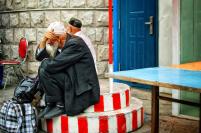
Initium Media editor’s note: In August, the United Nations Committee on the Elimination of Racial Discrimination reported that more than one million Uyghur people may be secretly imprisoned by the Chinese government in “re-education” camps in Xinjiang. During a public event in New York on September 28, Chinese Foreign Minister Wang Yi (王毅) did not provide a direct response to the question of re-education camps. Instead, he emphasized that the Chinese government’s actions in Xinjiang seek to prevent and curb terrorism, in what he called a “Chinese government action for the good of the common people”.
In recent years, much news about Xinjiang is censored, but trickles of information are managing to escape the wall of censorship and reveal to us what is going on in the region. Initium Media had the opportunity to interview a former student in Xinjiang, an ethnically Han Chinese individual who studied the Uyghur language. He said one of the most common career paths for graduates of his program is to assist in the government’s efforts to monitor the Uyghur people.
During his time in school, he was obligated to take political training classes as well as write ideological reflections on a weekly basis. He also had to hand over his phone and laptop to authorities for inspection every month.
Certain teachers would be teaching a class one day, and would suddenly disappear the following day. Even when privately discussing the missing teachers in the residence hall, fellow roommates would warn him that “I will report you to the authorities if you continue with these discussions…”
Although he loved the scenery, the food and his kind-hearted friends in Xinjiang, he decided that upon graduation, he would not stay in Xinjiang, no matter what. He left to study abroad, and below is his narration of his previous experience as a student in Xinjiang:
“I saw more armoured cars and tanks in Xinjiang than I had ever seen in my life”
The Xinjiang I experienced when I first arrived and the Xinjiang of today are completely different. Before I studied there, I heard that it was a place with many strict rules, but I was only slightly worried. When I first arrived, nothing seemed too inconvenient either. The situation became increasingly complex and tense in 2016, when more checkpoints and inspections of all kinds began.
Security at school became perversely strict. Students had to swipe IDs at school entrances, classroom buildings and residence halls. There were room checks at our residences every night. Things were manageable for ethnic Han Chinese students. If you forgot to bring your ID card, you could ask your roommate to send a picture of your student ID by phone.
But this was definitely not the case for Uyghur students. Checkpoints in the city of Urumqi in general became very strict. There was almost one check point after every five steps, visible every couple hundred metres. At the Erdao Bridge Grand Bazaar—a famous commercial center in Urumqi—you would encounter cops walking on the street. The police would stop you to inspect your phone, regardless of whether you are a Han Chinese or an ethnic minority.

The Grand Bazaar in Urumqi. Antoine 49/Flickr.
We needed to pass security clearance even in shopping malls, not to mention airport terminals and train stations. In areas such as shopping districts, there were armoured cars parked at every street corner and mall entrance. Special force police officers carrying big guns were on patrol everywhere. I saw more armoured cars and tanks in Xinjiang than I had ever seen in my life.
READ THE FULL ARTCICLE AT The Taiwan Gazette
